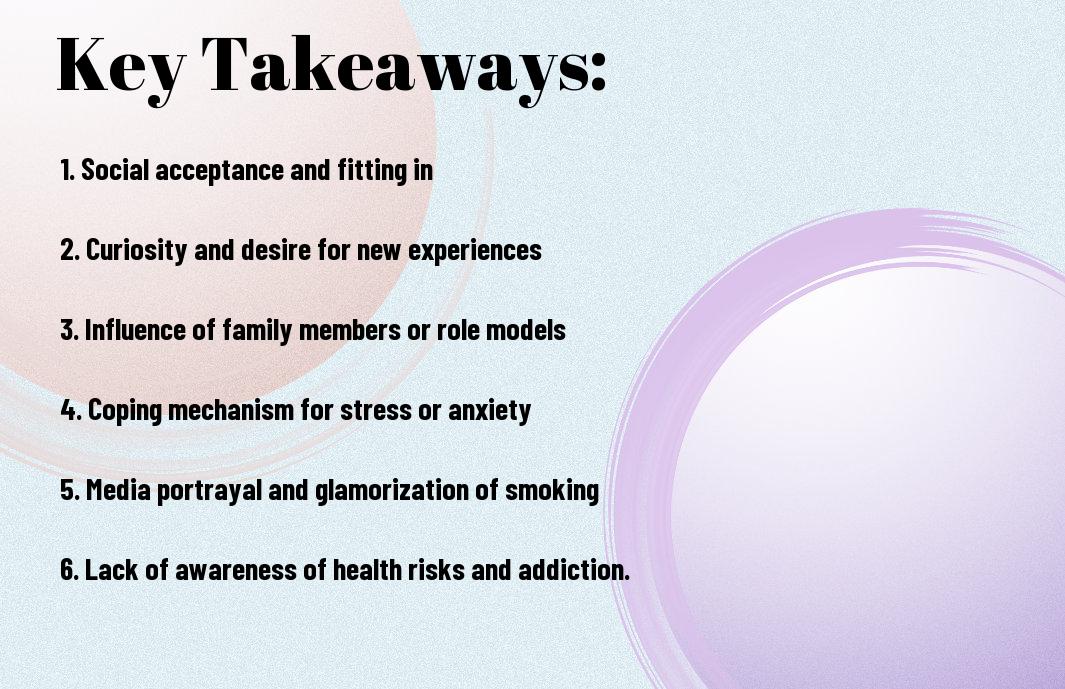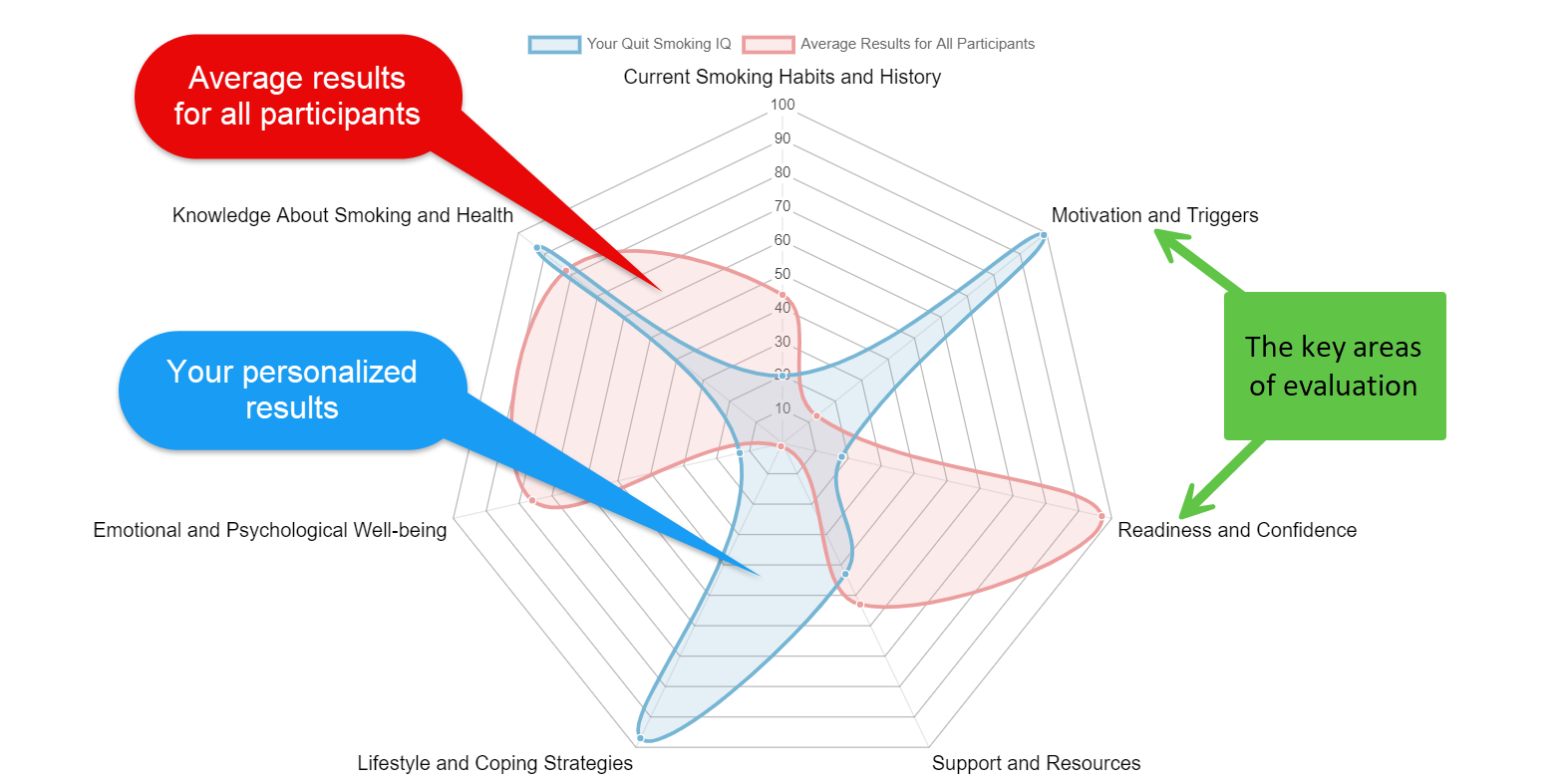
Conforming to societal norms and the influence of your peers can certainly be major factors in initiating cigarette smoking, but there are surprising, lesser-known reasons that may lead individuals to pick up their first cigarette.
Whether it’s the desire for a quick stress relief, the appeal of rebellion, or the belief that cigarettes can help with weight control, there are various compelling factors that can contribute to someone taking that first puff. In this blog post, we’ll explore some of these unexpected motivations that may drive individuals into the world of smoking.
By understanding and recognizing these underlying reasons, you can gain insight into the complexity of smoking initiation and make informed choices when it comes to your own health and well-being.
It’s crucial to be aware of these influences in order to effectively combat the allure of smoking and guide others towards healthier alternatives.
So, let’s delve into the fascinating array of reasons behind that initial decision to smoke, and arm ourselves with the knowledge needed to resist these temptations.
Key Takeaways:
- social influences at play when it comes to picking up smoking. Family members, media, and societal norms can all impact an individual’s decision to smoke.
- Emotional Regulation: Many people turn to cigarettes as a way to cope with stress or to manage difficult emotions. Understanding the emotional triggers behind smoking can provide insight into why individuals start this habit.
- Marketing and Advertising: The tobacco industry invests heavily in marketing and advertising that targets young people. This can create a perception that smoking is glamorous or cool, leading individuals to try cigarettes for the first time.

Historical Context of Smoking
Some of the reasons why people pick up their first cigarette can be traced back to the historical context of smoking. Understanding the historical background of smoking can shed light on the factors that have influenced its prevalence over time.

Sometimes quitting can be really tough and now you can find the reason.
Take our FREE assessment and find out what is holding you back from quitting smoking in just 60 seconds.
From cultural traditions to the rise of tobacco advertising, the historical context of smoking reveals the complex interplay of social, economic, and psychological factors that have contributed to the widespread use of tobacco.
Smoking in cultural traditions
In many cultures around the world, smoking has deep-rooted traditional significance.
Whether it’s used in rituals, ceremonies, or social gatherings, smoking has been a part of cultural practices for centuries.
For example, certain indigenous communities use tobacco in sacred rituals as a way to connect with the spiritual world. In other cultures, smoking is a symbol of social status and is associated with hospitality and camaraderie.
These cultural traditions have shaped the perception of smoking and have contributed to its acceptance in society.
The rise of tobacco advertising
During the 20th century, tobacco advertising played a significant role in shaping the public’s perception of smoking.
Cigarette companies used sophisticated marketing strategies to glamorize smoking, associating it with notions of sophistication, beauty, and independence. Advertisements featuring iconic figures and celebrities of the time reinforced the allure of smoking, positioning it as a desirable habit.
The pervasive nature of tobacco advertising made smoking seem appealing and influenced many individuals to take up the habit.
The rise of tobacco advertising significantly contributed to the normalization and glamorization of smoking in popular culture.
By understanding the historical context of smoking, you can gain valuable insight into the social and cultural forces that have influenced the prevalence of smoking.
It’s important to recognize how smoking has been ingrained in cultural traditions and how tobacco advertising has played a role in shaping the public’s perception of smoking.
The pervasive influence of these factors underscores the need to critically evaluate the portrayal of smoking in society and to recognize the potentially harmful consequences.
Psychological Factors
Unlike peer pressure and social influences, there are several psychological factors that can contribute to the decision to pick up your first cigarette. Here are some key psychological reasons why people start smoking:
- Curiosity: Curiosity is a powerful force, and it can drive you to experiment with smoking, especially if you are curious about the effects and sensations associated with smoking.
- Stress and emotional regulation: Many people turn to smoking as a way to cope with stress, anxiety, or other negative emotions. It can provide a temporary sense of relief and distraction from intense feelings.
- Self-image and identity exploration: Smoking can be seen as a way to express independence, rebellion, or sophistication. It may also be perceived as a way to fit in with a certain social group or to appear more mature.
Any of these psychological factors can play a significant role in influencing your decision to smoke for the first time.
The role of curiosity in smoking initiation
Curiosity is a natural human trait, and when it comes to smoking, it can be a significant factor in the decision to experiment with cigarettes.
You may be curious about the taste, the sensation of inhaling smoke, or the effects that smoking has on your body and mind.
Many people are drawn to try smoking simply out of curiosity to see what it’s like, and this initial experimentation can lead to regular smoking behavior.
Stress and emotional regulation
Smoking is often used as a coping mechanism for dealing with stress, anxiety, and negative emotions. If you find yourself turning to cigarettes when you’re feeling overwhelmed or upset, you are not alone.
The temporary relief that smoking provides can be highly addictive, and you may continue to smoke in order to manage your emotions, even though it poses serious health risks.
Self-image and identity exploration
When you are exploring your identity and seeking independence, smoking can be perceived as a way to express yourself and assert your autonomy.
Additionally, if smoking is prevalent in your social circles or is associated with a particular image that you want to embody, you may be more inclined to pick up a cigarette in order to fit in or appear more mature.
However, it’s important to consider the potential long-term impact of your decisions on your health and well-being.
Socioeconomic Influences
To understand why people pick up their first cigarette, it’s important to consider the influence of socioeconomic factors. These can play a significant role in shaping our attitudes and behaviors towards smoking.
Smoking prevalence in different economic strata
Smoking prevalence varies across different economic strata. Research has shown that individuals from lower socioeconomic backgrounds are more likely to start smoking compared to those from higher socioeconomic classes.
This is due to a range of factors, including higher stress levels, lower access to resources for quitting, and higher exposure to pro-smoking influences in their environment.
In addition, the tobacco industry has been known to target lower-income communities with aggressive marketing campaigns, further perpetuating the prevalence of smoking in these groups.
The impact of parental and familial smoking habits
The impact of parental and familial smoking habits cannot be overlooked when examining socioeconomic influences on smoking initiation. Studies have shown that children whose parents smoke are more likely to take up smoking themselves.
This can be attributed to both genetic and environmental factors – children of smokers may be more exposed to secondhand smoke and may also view smoking as a normalized behavior within their household.
Additionally, lower-income families may have limited access to smoking cessation resources and may face greater challenges in breaking the cycle of smoking within their families.

The Media’s Portrayal of Smoking
Your exposure to smoking in the media has a significant impact on your perception of it.
The way smoking is portrayed in movies, television, and other forms of media can influence your decision to start smoking. It’s important to be aware of the potential effects of the media’s portrayal of smoking on your behavior.
Cigarettes in movies and television
Smoking is often glamorized in movies and television, with characters lighting up in scenes that convey a sense of sophistication, rebellion, or relaxation. This portrayal can make smoking seem attractive and desirable, especially to impressionable individuals.
The repeated exposure to smoking in a positive light can subconsciously influence your attitudes and behaviors towards smoking.
Research has shown that exposure to smoking in movies increases the likelihood of starting smoking among young people, making it a concerning influence on smoking initiation.
The influence of celebrity smoking
Celebrities have a powerful influence on public perception and behavior, and this extends to smoking as well.
When you see your favorite celebrities smoking in movies, on TV, or in real life, it can make smoking seem glamorous and cool. The association of smoking with famous and influential figures can lead you to view smoking as a desirable behavior, despite the known health risks.
This can create a sense of aspiration and emulation towards smoking, especially among impressionable individuals who look up to these celebrities.
The influence of celebrity smoking on your decision to start smoking should not be underestimated, as it can have a significant impact on your attitudes towards smoking.
Genetic Predispositions
Despite the common belief that peer pressure and environmental factors are the main reasons why people start smoking, there is a growing body of evidence to suggest that genetic predispositions play a significant role in this behavior.
According to a study published in the National Center for Biotechnology Information, genetic factors may have a substantial impact on an individual’s susceptibility to smoking initiation and nicotine addiction. You can read more about this study here.
The biology of nicotine addiction
When you inhale cigarette smoke, nicotine quickly enters your bloodstream and travels to your brain, where it binds to receptors and releases dopamine, a neurotransmitter that creates feelings of pleasure and reward.
Over time, your brain becomes accustomed to the presence of nicotine, and you may require increasing amounts of it to achieve the same pleasure. This process, known as nicotine addiction, can make it incredibly challenging to quit smoking once you’ve started.
Familial history and the genetic component of smoking behavior
If you have close family members who smoke, you may be more likely to pick up the habit yourself. Research has shown that individuals with a family history of smoking are at a higher risk of becoming smokers, suggesting a strong genetic component to this behavior.
This doesn’t mean that you are destined to smoke just because your parents or siblings do, but it does indicate that your genetic makeup can influence your susceptibility to the addictive nature of nicotine.
By understanding your genetic predispositions, you can make more informed decisions about your smoking behavior and take proactive steps to protect your health.
Misconceptions About Smoking
Now that you have decided to explore the reasons why people may pick up their first cigarette, it is important to address the misconceptions surrounding smoking. Many individuals are influenced by common myths and misunderstandings when it comes to the habit of smoking.
By understanding the reality of smoking and nicotine addiction, you can gain a clearer perspective on the dangers and reasons behind this behavior. Let’s delve into some of the most prevalent misconceptions about smoking.
Debunking common myths
One of the most widely believed misconceptions about smoking is that it makes you appear “cool” or “rebellious”. This image has been perpetuated through media and cultural influences, but the reality is that smoking can negatively impact your health and wellbeing.
Another common myth is the idea that smoking helps to relieve stress. Research has shown that while smoking may provide a temporary sense of relief, it increases your stress levels in the long run.
Understanding the reality of nicotine dependency
It’s crucial to understand the reality of nicotine dependency and the addictive nature of smoking. Nicotine is a highly addictive substance, and once you begin smoking, your body and mind become reliant on it.
This dependency can make it extremely challenging to quit smoking, leading to long-term health issues and a diminished quality of life. It’s important to recognize the power of nicotine addiction and the impact it can have on your overall well-being.
By addressing these misconceptions and understanding the harsh reality of nicotine dependency, you can gain a clearer understanding of the dangers of smoking. It’s important to recognize the gravity of the situation and prioritize your health and well-being.
Take the first step towards a smoke-free life and make informed, empowered choices for yourself.
Interventions and Preventative Measures
For those who have yet to pick up their first cigarette, interventions and preventative measures play a crucial role in deterring smoking initiation. There are various initiatives and strategies in place to discourage individuals, especially youth, from taking up smoking.
Educational programs and policies are two key approaches that aim to reduce the prevalence of smoking initiation.
Educational programs targeting youth
Educational programs targeting youth play a vital role in preventing smoking initiation. By providing young individuals with comprehensive information about the dangers of smoking, these programs empower them to make informed decisions about their health.
They often emphasize the negative impact of smoking on physical health, mental well-being, and overall quality of life. Additionally, educational programs equip young individuals with the necessary skills to resist peer pressure and make healthy choices.
By fostering a strong sense of self-awareness and confidence, these programs help deter first-time smoking.
Policies and legislation to reduce smoking initiation
Policies and legislation aimed at reducing smoking initiation are essential in creating a societal environment that is less conducive to smoking. With the implementation of strict regulations and laws, access to tobacco products becomes more limited, making it more challenging for individuals to obtain cigarettes.
These policies also include measures such as increased taxation on tobacco products, making smoking a financially less attractive option for potential new smokers. By creating a social stigma around smoking and enforcing stringent regulations, policies and legislation act as a deterrent to smoking initiation.
Conclusion
Drawing together the various reasons why people pick up their first cigarette can help you to better understand the complex factors at play. While peer pressure is one common reason, it’s far from the only one.
It’s important to recognize the role of stress, curiosity, genetics, and the influence of the media and marketing in shaping your attitudes toward smoking. By acknowledging these factors, you can gain a deeper insight into why you or someone you know may have started smoking.
If you or someone you know is struggling to quit smoking, it’s important to seek support and professional help. Understanding the reasons why people continue to smoke can also be helpful in finding effective strategies for quitting. For more information on the ten reasons why people continue to smoke, visit Ten Reasons Why People Continue To Smoke.
FAQ
Research has shown that people may start smoking due to factors such as peer pressure, stress, curiosity, and the influence of media and advertising.
Peer pressure can play a significant role in influencing individuals to pick up their first cigarette, as they may feel pressured to fit in with their peers or be seen as cool. Social acceptance and the desire to be part of a certain group can lead to smoking initiation.
Stress can be a trigger for some individuals to start smoking, as they may perceive cigarettes as a way to cope with stress or anxiety. Some people turn to smoking as a form of self-medication to alleviate emotional distress.
Curiosity about the effects of smoking and the desire to experiment with cigarettes can lead individuals to pick up their first cigarette. The curiosity about the experience and the perceived social benefits of smoking can be a driving force in smoking initiation.
The portrayal of smoking in media, including movies, TV shows, and advertisements, can normalize and glamorize smoking, influencing individuals to start smoking. Exposure to smoking imagery in the media can create a perception that smoking is desirable and socially acceptable.
